All Available Episode
All Season 5 Episode
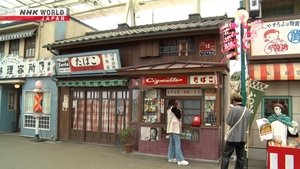
1. Showa Nostalgia
In recent years, a sense of nostalgia has been spreading among young people in Japan for the Showa era, which lasted from 1926 to 1989. A theme park has opened a recreation of a 1960s shopping street. Radio-cassette players and colorful retro designs are once again popular. And long-established cafes serve recipes that haven't changed in decades. We introduce some of the cultural elements defining an era that many Japanese people consider the "good old days."
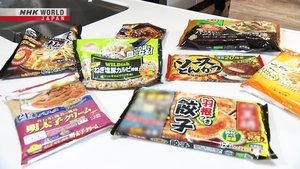
2. Frozen Food
Frozen food is extremely popular in Japan. A supermarket may have a dedicated section with hundreds of frozen items. While pasta is the most popular frozen food, options range from chopped vegetables to sushi. One key to the success of frozen food is flash freezing, which limits damage to food cells during the freezing process, thus preserving taste and texture. Flash freezing is a great way to make food last longer. We review the history of Japanese frozen food and introduce recent innovations.
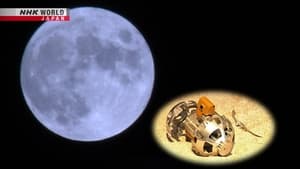
3. The Moon
The waxing and waning moon. Throughout Japan's history, it has been loved, cherished and given many special names. Moon-viewing events are held across the country at the time of the beautiful harvest moon, which occurs during the eighth month of the traditional calendar. And the moon's gravitational pull has long been important in agriculture and fishing. We introduce Japan's aesthetic appreciation of the moon and look at some new technology being developed for use on the lunar surface itself.

4. Kitchens
Many Japanese kitchens are now hyper-modern, but two or three centuries ago, most were basic spaces with dirt floors. One turning point came after the Second World War. Large apartment complexes built to address a housing shortage needed to be compact. For the first time, cooking and eating spaces were combined into one carefully designed "dining kitchen." Since then, kitchens have improved in both comfort and convenience. We introduce the ongoing evolution of the Japanese kitchen.
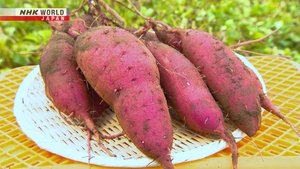
5. Sweet Potatoes
Sweet potatoes are a popular food throughout Japan. They're baked, simmered, added to soup, and turned into confectionery. Baked sweet potatoes are a beloved street food. Recently, sweet potatoes have also been used for purposes other than food. They've been planted on rooftops to keep buildings cool, and waste material from sweet potatoes has been fermented to produce methane for use in generating electricity. We introduce the increasingly diverse ways in which sweet potatoes are used and sold.

6. Dinosaurs
Once thought to have no dinosaur fossils, Japan is now a hot spot for dinosaur discovery. The excavation of Kamuysaurus japonicus in Hokkaido Prefecture overturned the conventional wisdom. It sparked a nationwide enthusiasm for dinosaurs that led to new forms of entertainment, including dinosaur robots in hotels and mechanical dino-suits used in live performances. We look into Japan's love for dinosaurs.
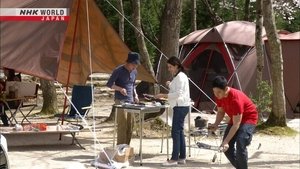
7. Camping
Camping is increasingly popular in Japan, with around eight million people participating annually—in various different ways. Popular styles include women-only trips and solo camping. Some people prefer glamping, where they don't have to set up their own tent. Camping has also been drawing attention as a good way to develop useful survival skills. We investigate why so many people in Japan are going camping these days, and look at some new equipment options.
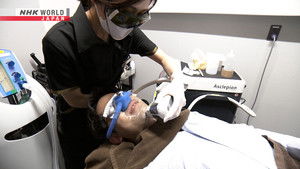
8. Male Aesthetics
Male cosmetics are popular products in Japan, even as challenging economic conditions continue. Social media and the increase of remote work meetings have contributed to a growing concern among men about their appearance. The popularity of hair removal treatments is evidence of that trend. But a look back at Japanese history shows that men have used cosmetic products for over a thousand years. We look at the evolution of male aesthetics in Japan.
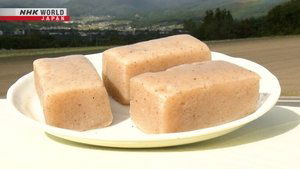
9. Konnyaku
Konnyaku is an important element of Japanese cuisine. It has long been known as a high-fiber, diet-friendly food, and in recent years it's been shown to offer health benefits such as reducing the risk of dementia and lowering blood sugar levels. Konnyaku is a chewy, jelly-like food made from the extremely bitter corm of the konjac plant. How is it processed? And what other uses does it have? We observe how it's made and look at the many dishes that incorporate this surprising food.
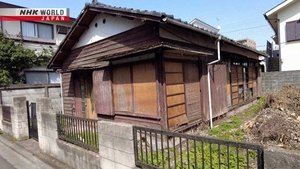
10. Vacant Homes
One in every seven homes is empty in Japan. These 9 million vacant properties may increase the risk of fire and unlawful entry, or negatively impact local real estate prices. But new initiatives are emerging to make use of them. One regional community turned empty homes into shops and offices for technology companies, which led to an increase in the local population. In Tokyo, new tenants in formerly vacant storefronts have revitalized a shopping street. We investigate the issue of vacant homes in Japan and discover some creative solutions.
